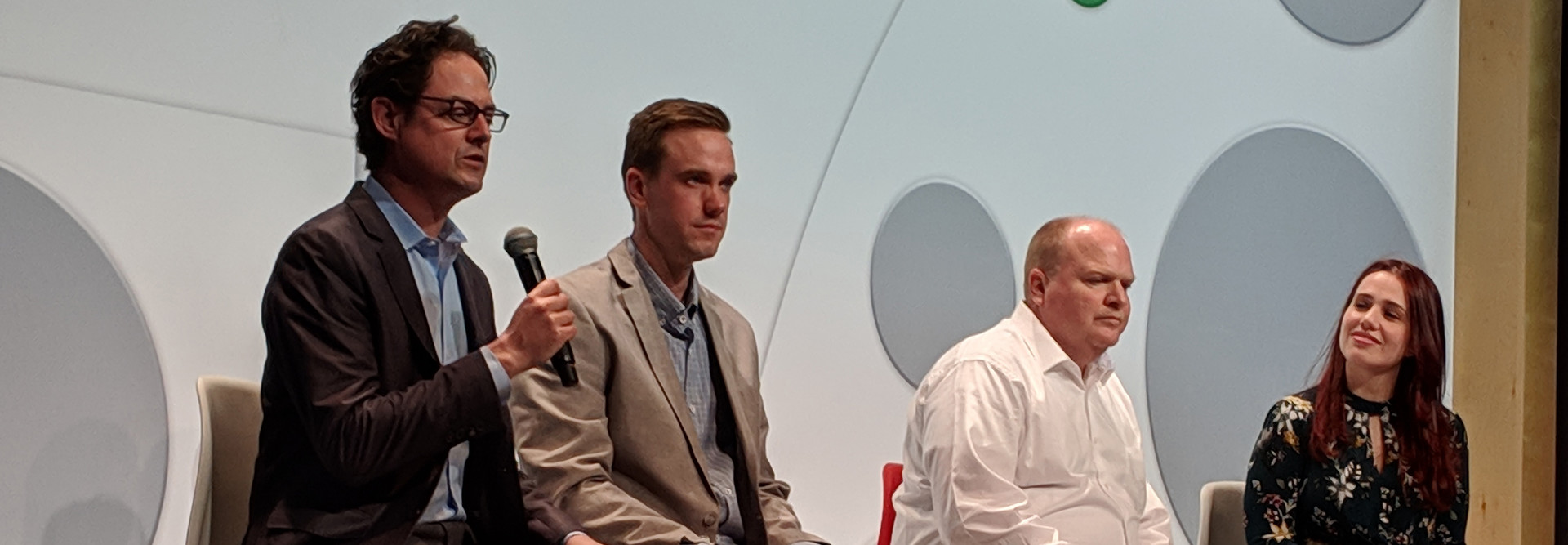Businesses Overcome Fear of Change to Adopt Cloud-First Hardware and Software
With their affordable price points and easy manageability, Google Chromebooks are great for kids and schools. And, of course, they’re perfect for web surfing. But what about deploying them inside a business to dozens — or thousands — of workers? Some businesses worry that the devices just aren’t feature-rich enough for most use cases.
But that’s wrong, says Cyrus Mistry, group product manager for Chrome Enterprise.
“Businesses love the idea of a simple, secure endpoint,” Mistry said at Google Cloud Next ’19, the annual conference for users and developers working on the Google Cloud Platform, which continues in San Francisco through April 11.
During the event, one key mission for the company is to continue to persuade businesses to see it Google as a provider of enterprise-class hardware and software services built for cloud-first organizations.
Gordon Food Service, a Michigan-based food distributor throughout much of the U.S. and Canada, has been successful moving most of its thousands of employees onto the G Suite of business collaboration and productivity software tools, despite some initial skepticism and resistance.
And when it comes to Google’s signature Chromebooks and its Chrome OS, Mistry argued that many perceptions of the device are simply myths — some borne of Google’s success in conquering certain market segments, others due to its success overcoming technical challenges that users of other operating systems just accept as part of life.
Chromebooks Are Not Just for Schools
Take the idea that Chromebooks are primarily for education. It’s true that Chromebooks own 70 percent of the market share in the education space. But sales have grown at a 33 percent clip in the commercial space since 2017, Mistry said, while other PC sales have grown just 1.8 percent.
Or how about the perception that Chromebooks aren’t “enterprise-grade”? On the contrary, manufacturers are building the devices with every bell and whistle imaginable. The latest Google Pixelbook, for example, comes with an i7 processor, 16GB of RAM and a flip design to go along with its 12.3” high-definition touch screen.
Not every Chromebook is necessarily right for every business, says Mistry, but “you can absolutely get enterprise-class Chromebooks in any form factor you want.”
The size of an organization is also not a true barrier to deployment, he says; if anything, the simplicity of provisioning and managing Chromebooks in the cloud makes them ideal for large deployments: “There are several enterprise deployments with more than 100,000, and most of them didn’t have to hire a single additional IT person, which is just staggering.”
But isn’t true that Chromebooks only work online? Nope? They come with their own discs “absolutely” work offline, Mistry says. “I usually encourage application developers to build things offline first, and there are tons of offline applications that work with Chromebooks,” he said. But without built-in anti-virus software, how can they be secure? Because the Chrome OS is completely locked down. Installed apps and extensions can’t modify it.
“The second thing we do with Chromebooks is sandbox everything,” he said. “Things would have to hop out of many, many containers and sandboxes to get access to anything else.”
SEE MORE: Get help sorting through the dizzying array of cloud and on-premises computing options.
G Suite Resistance Melts Quickly
Many Gordon Food Service end users were surprised to discover how easy it was to work with G Suite productivity tools like Google Docs, Sheets and Slides, which have a cloud-based architecture that simplifies collaboration. Though the company has only a small number of Chromebooks, it began standardizing on Google’s G Suite of business applications almost seven years ago as part of a companywide effort to improve its collaboration and move into the cloud.
“Cost avoidance was a huge issue,” said Jeff Johnson, the company’s end user experience lead, explaining its motivations for making the change. “Many of our licenses were running out and it was time to renew them. This was a great opportunity to re-evaluate that.”
Today, it has about 17,0000 G Suite users and more than 80 percent of its workers are using G Suite primarily.
For companies that have long used standard PCs and traditional office tools managed on-premises, it’s a common concern among both IT teams and end users that adopting Google solutions is just too big of a change. The truth is that adopting Chromebooks within an enterprise doesn’t require end users to abandon their old productivity tools if the business wishes to keep them, while adopting G Suite works just fine on any computer.
“Google’s in a weird position,” Mistry says. “We’re not interested in having you in our products for very long. When you think about search, we do well when you get to what you want quickly. Our goal is always to get out of the way and get you to the content.”
Keep this page bookmarked for complete coverage of Google Cloud Next '19.










